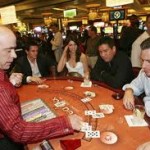 Click Here To Access Your Free E Books.
Click Here To Access Your Free E Books.
Gambling starts out for most people as a simple pastime that adds a bit of excitement to their daily life. This may include small wagers with friends on sporting activities, heading out to a casino or betting on a card game with friends. However, for some individuals, the excitement and the subsequent release of the pleasure chemicals in the brain creates the need for more and more pleasure and the driving urge to gamble again and again.
Just how gambling impacts the brain and triggers an addictive behavior cycle is very similar to the way that drugs become additive. The most problematic part of gambling is that every time the gambler wins two different types of positive reinforcement for the behavior occurs. First, the gambler gets an actual tangible reward, which is the money. Second, this is paired with a flood of pleasure chemicals in the brain that provide a positive reward. Since these are delivered randomly, the gambler continues to bet to try to obtain these rewards. Despite the fact that the gambler invests much more than he or she wins, the rewards are so pleasurable they will keep on and on.
Not all people that gamble have this behavior problem, just like all people that use drugs or alcohol don’t become addicts. There is actually a change in the neurological responses in the brain and the brain circuitry. Over prolonged time gambling this pattern of responses becomes hard wired, creating the addiction that will eventually lead to complete personal and financial ruin if not treated and managed.
If you are concerned about a family member or friend with a gambling problem look for the following red flags:
- Belief that gambling is a game of skill not a game of chance.
- Belief that gambling poses no problem despite relationship destruction, financial problems and trust problems.
- Gambling becoming the primary interest in the person’s life.
- Hiding or lying about gambling activities.

